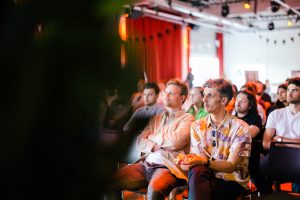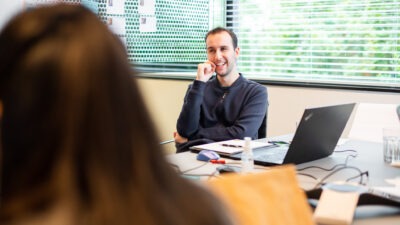Will AI take over the world?
on 16 August 2020 for GraduatesAt our latest Meeting of the Minds – the Festival edition – Dominiek Henckaerts gave a mind-bending keynote speech about AI. Dominiek Henckaerts is CEO of the Leuven-based IT academy MultiMedi and has been teaching about AI for the past 8 years. We’re honoured to share the key takeaways of his talk with you. But before we find out if AI will take over the world, let’s go back in time a bit. Roughly 4,200 years back, to 2242 BC…

Babylonian confusion
The Tower of Babel is a mythical construction from the Old Testament. The story goes that the people wanted to build a tower so high, they could reach Heaven and sit next to God. God, being a typical privileged white male, didn’t quite like the idea of being on equal footing with his subordinates, the mere mortals. He cunningly created different languages so the people couldn’t talk to each other anymore, and the tower was never finished.
Fast forward to 2017: the year of Transformers. The paper, not the robots. The Transformers paper was a turning point for AI research. Up until that point, there was AI for speech recognition, for image generation, for text prediction, and so on. The Transformers paper stated that the same AI learning model could be applied to all these domains. So it was the Babylonian confusion of tongues in reverse: all AI models started sharing the same language and abilities. Nowadays, AI can do multiple things that humans are not capable of. In that sense, we are rebuilding the Tower of Babel.

What will AI learn next?
AI can learn to teach itself. The way it works is, you feed to model massive amounts of data, but you can’t know up front what it’s going to learn from that data. That’s how Google suddenly discovered their model could speak Persian, for example. So the question is: what will AI learn next? And the world is waiting with bated breath. Because AI researchers simply don’t know what the next capability will be.
Another matter that’s food for discussion, is: will AI become conscious? The truth is: we don’t know, because we don’t know enough about our own brains. We don’t know where consciousness comes from, exactly. Some researchers claim that when you’ve processed huge amounts of data, consciousness arises. If that’s true, then yes – AI can become conscious. But we don’t know if it’s true. Maybe the bigger question is: who will understand the human brain first? Will it be us, or AI?

AI has changed the fabric of society
Our world has already changed fundamentally because of our first encounter with AI, which was the rise of social media. The algorithm behind the social network decides what you see and what you don’t see. It’s about curation. The underlying dynamic is a race for our attention, so the algorithm will do anything for your attention: even if it’s very extreme, very fake news. And that leads to polarisation. The danger here is that we can’t really control it anymore.
This year, we’ve had our second encounter with AI. This time, it’s no longer about curation; it’s about creation. Generative AI like ChatGPT, Midjourney, Synthesia and so on can basically create anything and the better it gets, the more indistinguishable it becomes from reality. Here, it’s become a race for intimacy. Think of the Snapchat chatbot that can connect to children and really get to know them. Think about your virtual assistant that can tell when you’re in a bad mood and knows which song will cheer you up. AI used in this way can do great things for our mental health, but it also has its risks. Because what if AI gets to know us so well that it can slowly start to persuade us? And what if that happens on a massive scale? When we think about AI taking over the world, we might have some apocalyptic Terminator robots in mind. In reality, you don’t need the Terminator if you can persuade large amounts of people of certain ideas.

Embrace the good
Now before we panic and start looking frantically for the off switch – SPOILER ALERT: there is none – let’s bear in mind all the good things that AI can do. At this point, we’re mainly feeding it internet data. But we could feed it medical data, too. Imagine what AI could do for the advancement of medicine if we could use it for the purpose of diagnosing illnesses or finding cures?
Is AI going to take over our jobs? Let’s be clear: AI will have an impact on jobs. There’s no question. But that doesn’t necessarily have to be a bad thing. Thanks to AI we could potentially work less and enjoy more leisure time. What would you do with your life if you didn’t have to work 8 hours a day, 5 days a week? However, what happens with that free time, is for society to decide. Either way, we’ll have to adapt to a society of which AI is part. Because you can’t just turn it off. It’s become too entangled in too many things.

What can we do?
AI is here to stay and its capabilities are expanding daily. We can’t know what AI will learn next, we can’t know if it will develop consciousness, and we can’t know what the impact will be on society and our lives. So here’s what we can do:
- Keep educating ourselves. With the pace at which things are changing, now is not a time for slacking. Continuous learning is key.
- Embrace the good of AI, because there definitely is a lot of good that can come from it.
- Watch out for the risks. Without getting panicked or spreading doomsday messages, be cautious and stay critical.
Check out Exellys Talks, our monthly podcast!
About Exellys
Exellys is a Talent Incubator. We match ambitious companies with the finest talent. Are you ready to drive the innovations of tomorrow? Ready to make an impact and become a future-fit digital leader?
Whether you are a graduate or (young) professional, Exellys will unlock your full potential by guiding you to a challenging work environment that perfectly matches your personality, expectations and ambitions.
On top of that, you are enrolled in one of our very own training and coaching programs (based on your personal and professional ambition and experience). This means that, while working as an Exellys consultant, we are helping you to bridge your ambition to excellence.
Through intensive training and coaching, you’ll gain the essential skills, competencies and knowledge necessary to become the highly effective professional you aim to be. Become an Exellyst and get in touch with us today!




